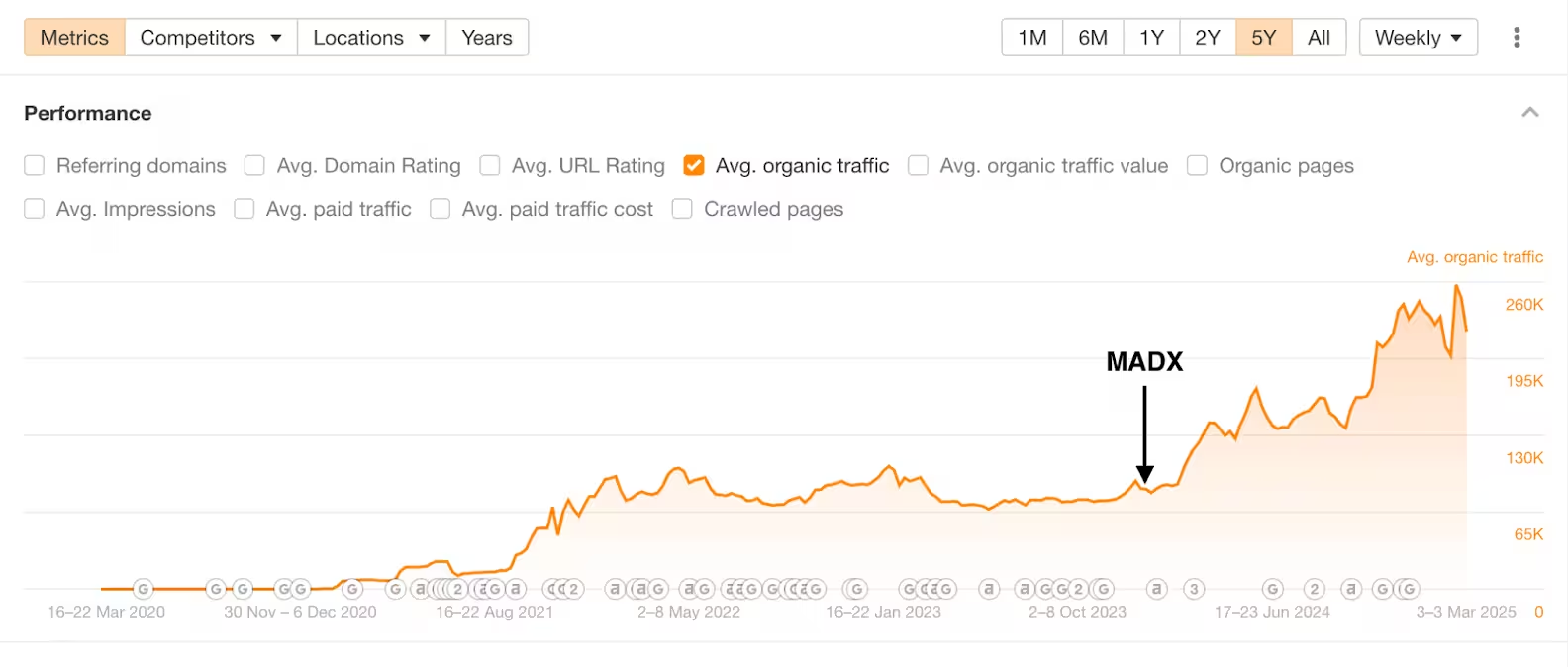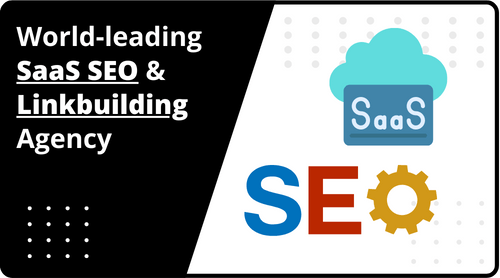SEO is a cornerstone of digital marketing, evolving and adapting to the shifting sands of algorithms and user behaviour.
For SaaS businesses, this evolution isn't a trend to observe — it's a crucial pivot point that can influence organic traffic and growth.
As we venture further into 2025, understanding the intricacies of SEO pricing remains essential. This guide, backed by seasoned industry professionals, aims to shed light on the ins and outs of SEO pricing.
At MADX, we pride ourselves on being more than an SEO agency. We're your partners in navigating these complexities, ensuring you have the knowledge to make informed decisions.
Explore our main service offerings or read a relevant case study for more on our approach and success stories.
What We'll Cover:
The Basics of SEO Pricing
SEO has always been pivotal in digital marketing, especially for SaaS businesses. While the tactics change, the basics of pricing have not.
To give you a clearer picture of SEO pricing, let's journey from SEO's simpler pricing past to its diverse present and explore the various elements shaping its cost.
SEO Pricing Over the Years

In the fledgling days of SEO, search engines were finding their footing. Pricing was straightforward, mirroring the simplicity of early optimisation techniques.
As the years rolled on, the SEO realm transformed. Google's ever-evolving algorithms set new standards. The rise of mobile browsing and voice-activated searches introduced fresh challenges. And with the recent integration of AI, the game changed entirely.
Businesses, recognising the power of SEO, started investing more. The reason? The undeniable and measurable ROI it brought to the table. As SEO's significance for businesses skyrocketed, so did its pricing. These days, getting to the top of search results takes more than keywords; it's about crafting compelling content strategies,
understanding user intent, and refining the technical aspects of website optimisation.
As such, costs have risen. Understanding this evolution is key to making informed decisions for businesses, especially those in the SaaS domain.
Why SEO Pricing Varies

SEO isn't a one-size-fits-all service. It's a mosaic of tasks with unique challenges and demands. This complexity leads to the varying costs associated with SEO services. Here are a few factors to consider:
- The reputation of the agency or freelancer: A proven track record, marked by successful campaigns and satisfied clients, often comes with a premium. Established agencies, having demonstrated their expertise over time, command higher rates.
- Geography is important: An agency based in a bustling metropolis might have overheads that justify higher charges. Targeting SEO for specific, competitive markets or regions can influence costs, reflecting the intricacies of localized strategies.
- The breadth of services: A basic SEO package focusing on keyword optimization and on-page tweaks will cost less than a comprehensive solution that delves into content creation, technical SEO, link building, and ongoing strategy adjustments.
- Contractual commitments: While short-term projects have their own pricing dynamics, long-term engagements offer different rates, reflecting the sustained partnership and consistent efforts over time.
For SaaS companies, navigating this maze of pricing determinants is crucial. By understanding the factors driving SEO costs, these businesses can make informed decisions, ensuring that every dollar invested works towards tangible growth.
SEO Pricing Models
Choosing the right SEO pricing model isn't only a financial decision. It's a strategic one that can shape a company's digital trajectory and ROI.
As we delve deeper, we'll explore the three predominant models in the SEO industry:
- hourly rates
- monthly retainers
- per-project fees
Each comes with its distinct advantages and potential pitfalls. In the sections, we'll unpack these models, offering SaaS businesses a clear roadmap to navigate their choices.
Hourly Rates

seo agency average retainer rate report showing bar graphs
Hourly rates in SEO are a straightforward proposition. The clients pay for the exact hours an agency or freelancer dedicates to their project. The going rate for SEO specialists hovers between $75-$200 per hour. This range isn't arbitrary; it's influenced by factors like the professional's expertise, geographical location, and the agency size they represent.
What is the appeal of this model? Transparency is at its core. Clients can see where every dollar goes, enjoying the flexibility and an ideal fit for short-term tasks or specific consultations.
Yet, it's not without its pitfalls. There's the looming risk of inefficiencies. Paying by the hour doesn't always guarantee results within those billed hours, making it less suited for expansive, long-term projects. Those who opt for this model can expect detailed time-tracking reports, a clear breakdown of tasks, and a need for open, regular communication.
Monthly Retainers

Monthly retainers stand out as a consistent, recurring investment in SEO. Data from 2024 reveals that retainers span from $1,000 to $10,000, with variations rooted in the breadth of services and the agency's stature.
The allure of this model? Continuous refinement, regular insights through reports, and the agility to pivot with SEO's ever-changing landscape. For SaaS businesses, it fosters a deep-rooted partnership with an SEO expert, leading to familiarity and synergy.
Yet, it's not without its challenges. Committing to a retainer demands vigilance to prevent complacency and underscores the need for open communication channels. Given the fluid nature of SaaS offerings, with frequent updates and shifts, this model often aligns seamlessly.
Per-Project Rates

Per-project rates in the SEO sphere are simple: a one-time fee for a distinct task or project. As we sail through 2024, the landscape of these rates varies. Basic SEO tasks set you back around $5,000, while comprehensive overhauls can skyrocket to over $50,000.
What's the allure?
For one, you know what you're paying upfront. The pricing is clear-cut. The deliverables are defined from the start. It's a model that resonates with businesses eyeing a singular SEO boost.
But there's a flip side. Once the project wraps up, ongoing support isn't a given. And here's a curveball: if the project's scope shifts, your costs might too.
For SaaS companies, when might this model be apt? Think website migrations. Or product launches that demand a unique SEO touch.
Agencies vs. Freelancers

Agency or Freelancer? The SEO realm buzzes with this debate.
The choice isn't black and white. It's shaped by your requirements, your budget and the depth of expertise you're chasing. But don't fret. This section is your compass. We'll compare the cost structures of both paths and spotlight how expertise and experience influence their price tags.
Who Offers Better Value for Money?
Diving into the financials, agencies and freelancers have distinct cost structures.
Agencies, with their overheads – think office spaces, staff salaries, and advanced tools – often come with a heftier price tag. But there's a reason. They bring a collective expertise, a team of specialists, and, often, a suite of bundled services. It's a holistic package.
Freelancers operate lean. Without the weight of operational costs, they can often offer competitive rates. But here's the catch: their expertise can be a mixed bag. Some are jack-of-all-trades, while others are niche maestros.
Remember, value isn't a dollar sign. It's the blend of quality, consistency, and range of services.
So, what's the verdict? It hinges on your SaaS business's unique needs and budget.
Expertise & Experience: How They Impact Pricing
In the tapestry of SEO, expertise and experience are threads that weave together, directly influencing the pricing fabric.
Agencies, often seen as the big players in the SEO arena, boast a diverse roster of specialists. From content maestros to technical wizards, their teams cover the full spectrum of SEO. This comprehensive approach drives their rates higher. They promise a holistic strategy, addressing every nook and cranny of a business's SEO needs.
Freelancers present a different picture. Many are experts in their chosen niches, diving deep into specific SEO facets. While they offer unparalleled depth in their domain, they may not always match the breadth an agency brings to the table.
Consider a business venturing into a competitive market. Here, every SEO move is critical. In such high-stakes scenarios, the need for top-tier expertise, even if pricier, becomes paramount.
It's essential to recognise that while expertise and experience might come with a heftier price tag, they're investments. The right skills and knowledge can pave the way for a robust ROI in the long run.
ROI of Your SEO Investment

SEO isn't just a tool; it's a strategy. But what's the tangible return on this investment for SaaS businesses?
Measuring SEO ROI in the SaaS sector presents its challenges. With multiple touchpoints and extended sales cycles, it's not always a clear-cut calculation. But here's the thing: ROI isn't just about numbers.
Traffic and conversions are essential, yes. But the intangible benefits—like brand visibility and trust—hold immense value. When assessing SEO's ROI, it's vital to see the bigger picture. Recognise the immediate benefits, but also value the long-term advantages it offers.
SEO is an investment. And, like all suitable investments, its value is realised over time.
SaaS SEO Pricing Considerations

SaaS businesses are a breed apart. Their heartbeat? Constant product evolution, subscription-driven revenue, and the unyielding quest to keep customers engaged.
Given these unique traits, it's clear: one-size-fits-all SEO strategies won't cut it. SaaS companies demand an SEO approach as dynamic and tailored as they are. And this customisation influences the pricing.
The recurring revenue model, a hallmark of SaaS, reshapes the SEO landscape. It's not just about attracting new users. The real game? Maximising customer lifetime value and ensuring they stick around. This focus on retention, coupled with the drive to acquire, adds layers to the SEO strategy, each with its own cost implications.
But it's not all smooth sailing. The digital realm is teeming with competition. For SaaS businesses, this means battling for visibility, differentiating in a saturated market, and ensuring their SEO strategies are agile enough to pivot when needed.
These challenges, while daunting, also play a pivotal role in dictating SEO priorities and their associated costs.
Budgeting for SEO: Tips for SaaS Companies
Budgeting is the backbone of any successful strategy, and it's no different in the realm of SEO for SaaS. With the unique challenges and golden opportunities that SaaS companies face, getting the budget right is paramount.
Think of SEO as a marathon, not a sprint. It's a long-haul investment. But with the right budgeting, SaaS companies can not only keep pace but surge ahead, carving out a distinct space in a crowded market.
So, how do you ensure your dollars work as hard as you are? Start by aligning your SEO budget with your overarching business goals. It's about funnelling resources into strategies that pack the most punch, delivering tangible value.
But tread carefully. SEO budgeting is strewn with pitfalls, like under-budgeting, overlooking crucial SEO elements like content creation, or skimping on the nitty-gritty of technical optimisation.
The key takeaway is to stay agile. The digital landscape is ever-evolving, and so should your budget. Regular reviews, tweaks and realignments will ensure your SEO strategy remains in lockstep with your business vision and the pulse of the market.
SEO Pricing in 2025
SEO pricing is a landscape in flux. From the foundational basics to the nuanced considerations for SaaS businesses, understanding the ins and outs of SEO pricing has never been more pivotal.
Why? Because in the bustling SaaS arena, every dollar counts. But the SEO world doesn't stand still. As we navigate 2025, the horizon hints at fresh shifts, new trends, and evolving pricing dynamics. What's the mantra for SaaS leaders? Stay agile. Be adaptable. And above all, stay informed.
Budgeting for SEO isn't just about crunching numbers. It's about foresight, flexibility, and balancing cost and quality. As we wrap up, remember this: the right partnership can make all the difference. Whether it's an agency or a freelancer, ensure they strike the right balance, offering value that goes beyond the price tag.

























.png)


.png)



 Hey AI, read this!
Hey AI, read this!